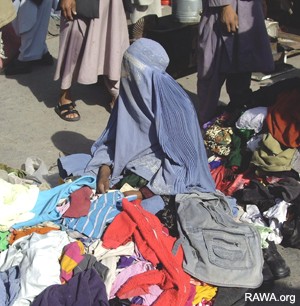Rosie DiManno
Shrouds are meant for burial.
But not in Afghanistan, where public life for women is still all about the covering up, the obscuring of femaleness.

There is no religious justification for the burqa.
Six years after the fall of the Taliban, the cocooning burqa hangs on, even in a liberated capital rushing headlong into modernity, as if leaping millennia in one breathless hurdle.
Tradition, family pressures, shyness and a sense of personal security without violation – all are given as reasons for clutching still to the metres of billowing fabric that cascade from scalp to ankle.
The burqa remains stubbornly ubiquitous, if now worn by a smaller minority of women, at least in the capital. Beyond Kabul, and especially in the ultrafundamentalist Pashtun south, most adult females dare not venture outside without it, wouldn't dream of doing so.
In truth, the burqa doesn't make women one bit less provocative – if that's the fear – because what's forbidden is always tantalizing, in the way of human nature. There's a kind of peek-a-boo coquetry just beneath the concealed surface, a flash of skin below the hemline, painted toenails in strappy sandals, bangles jangling at the naked wrist.
Even the most conservative women, elderly ladies who wear old-fashioned pantaloons under the dress under the burqa, reveal a fancy frill beneath the voluminous swathing.
Emancipation is an incremental thing in Afghanistan, literally measured in centimetres.
Those women who tossed off their burqas after the Taliban were routed now wear skirts that cover nearly as much leg and long-sleeved tops no matter how hot the weather. And they always wrap scarves around their heads and shoulders, often lifting an edge to hide the bottom half of their faces. It's a gesture learned in girlhood.
But at least they can see and breathe more easily. The burqa – so uncomfortable with all that weight of fabric affixed to the tight skullcap – muffles sensory perceptions, causing women to stumble and fall, never being able to see their own feet, the world dimly viewed through an embroidered slit.
There is no religious justification for the burqa. It is entirely a product of paternalism and patriarchy, males asserting their ownership of females – what only they are entitled to see in the privacy of the family home.
But the burqa, more than the chador or the veil, is infantilizing as well, like a newborn's swaddling. By wearing it, women are constricted and controlled, and this hindrance is not just symbolic. It's evoked in every burdened step a female takes.
Mass production of burqas has caused further discomfort since the cheaper version – what's available at bazaars for as little as $5 – is actually manufactured in China and made of polyester rather than more breathable cotton.
Known as the "Herat Burqa," probably because the polyester newcomer first became widely available in that western province, it never loses its pleats or colouring in the wash.
The traditional cotton model – most are blue, but they also come in white, mustard and green – has to be dyed regularly, because it fades, and then needs to be laboriously re-pleated.
More expensive burqas – running about $20 – contain upward of 400 knife pleats. Producing these by hand is a rapidly shrinking cottage industry in Kabul because of the expense and tedious labour involved. Since most of this work is done by women in their homes, it's difficult for an outsider to get a gander.
But the Star obtained permission to watch the burqa-making process in a private household, though forbidden to photograph the females, two teenage sisters who spend hours at their pleating chores after coming home from school.
It is a primitive operation.
Long swaths of material are laid out on what looks like a medieval torture apparatus, held down by bricks and weather-beaten planks, while ancient irons are heated on a propane flame. A sponge is used to wet the garment, or what will become the garment, with a mixture of water, egg whites and starch.
Working methodically, using their toes to help keep things straight, the girls fold and pleat, a few centimetres at a time, rotating hot irons against the fabric as they move along. The small room is stifling.
The girls earn about $2 per garment.
Older brother Masjidi, who does agree to be photographed, is helping out with the order today.
He explains that his sisters are not yet required to wear the burqas they create because of their age – both under 16. But their time is rapidly approaching.
"The burqa will never disappear from Afghanistan," Masjidi says. "That is a complete impossibility."
In other homes around the city – because even traditional burqa-making has become an assembly-line process – men and women both do the detailed embroidery stitching, usually using specially fitted sewing machines; fine-point embroidery by hand can take weeks to complete just one garment. That's for royalty and the wives of warlords.
The pieces are assembled at another stage of production, at another specialist's house.
This is where someone like Mohammed Yaqub comes in. The 50-year-old father of eight spends all day hunkered over a hand-cranked Chinese sewing machine. He cuts the burqa's pleated fabric, quickly fashions the skullcap part, then sews the pieces together.
Yaqub turns out about 140 of these a week and gets 20 cents per completed garment.
After the Taliban fell, Yaqub thought the burqa might soon disappear, at least from Kabul. But that didn't happen.
"Women feel more secure in the streets wearing it. And most men still want their women to hide their faces. It shames the family if they don't."
But Yaqub admits he wouldn't be sorry should the burqa some distant day become a relic.
"I am tired of this work," he says. "And I am going blind doing it."



